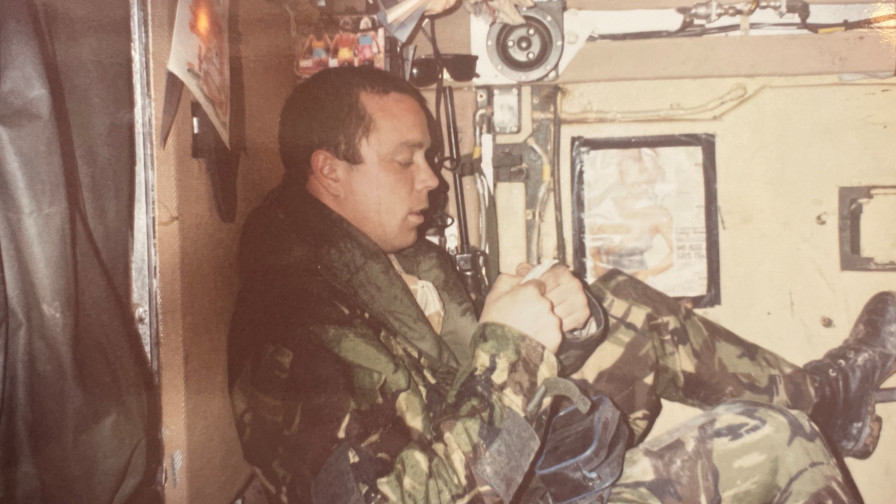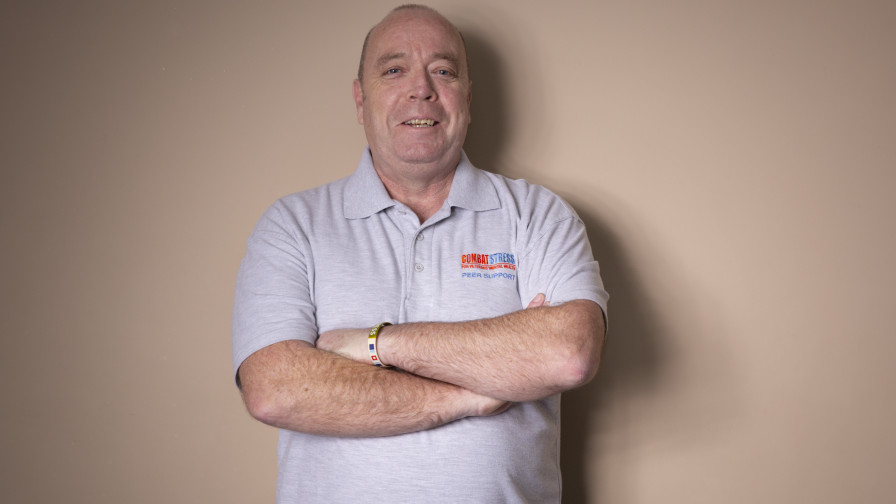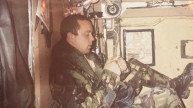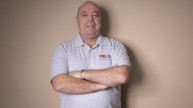Simon's Story
“Combat Stress saved me”
“I joined the Royal Engineers in 1984 when I was 16 and straight out of school. I did my apprenticeship in Chepstow. I served in Germany, Northern Ireland, Canada and served in the first Gulf (Iraq) war.
“I left the Army after 14 years as I felt I’d reached the end of my time – I’d done and seen everything I needed to, been to war, got the T shirt and wore medals. I got a civilian job working as a development analyst for an airline and had a successful career in project management, but I knew inside I was an angry man. I didn’t realise I had mental health issues, although I guess everyone me around soon realised.
“I had no patience and it wouldn’t take me long to go from calm to taking the world on - it didn’t matter what the consequences would be, in my mind it wasn’t me who had the issue, everyone else had the problem. I had no idea about PTSD – I just thought I was a veteran who was angry.
“By 2015 everything was going wrong around me and my relationships were rubbish, I was alienating people who cared about me. In my mind I had a deep, dark secret stemming from my time in the Army and I thought if people knew what it was, they wouldn’t like me. I hated myself so how could anyone like me, let alone love me? So, I did all I could to make people dislike me first, no matter who it was; parents, partners, whoever.
“I needed to fill my mind with other activities. If my mind wasn’t busy, the thoughts could get in and that wasn’t a place I wanted to be. I was working away a lot and I would just work, eat, go to the hotel on repeat to block everything in my head.
“I finally went to the doctor in 2016 on the “advice” of my family – it was get help or get out. The doctor suggested I needed help, he had a friend who had served and who had suffered, so I called Combat Stress and within 90 minutes I was talking to a nurse.
"I broke down on the phone – it was the first time someone had asked me “how are you?” rather than “do you realise what your actions are doing?”
“I went in for an assessment and cried for 10 minutes before I’d even been asked a question because I felt so broken, I didn’t know what to do. I saw myself as indestructible and here I was saying to some stranger “I’m broken, I need fixing”. From there I did a two-week stabilisation course, which gave you an insight into things like mindfulness, PTSD symptoms and recovery techniques, but the most useful thing for me was realising I wasn’t alone. I was with other veterans of all ages, who had served in many different conflicts, who were experiencing the same things as me.
“I was meant to take part in an intensive PTSD programme but didn’t go – I’d had my treatment and felt like I’d ticked that box so didn’t need more help, I mean what could go wrong? But things got worse again and came to a head just before Christmas. I was in a deep, deep hole and had no idea how to get out of it. So again, I called Combat Stress saying I needed help.
"On 2 January 2017 I began the six-week residential Intensive Treatment Programme and overall had treatment for around a year. I’d say from my experience it was mentally brutal, and it wasn’t nice bringing back memories, I was introduced to the delights of trauma sickness and disassociation but it had to be that way to get myself on the way to recovery.
“The treatment from Combat Stress has made a huge difference to my life. I can identify my triggers now and know how to avoid them. For example, the diesel-like smell of tarmac after rain can trigger me so I know to carry a Vick’s inhaler stick with me to stop disassociation and to bring me back to the present day.
“I’m a completely different person and four years ago started a new career working for Combat Stress starting as a regional Peer Support Coordinator, then Senior Peer Support Coordinator and now as Lead Peer Support Co-ordinator, working with veterans who are where I was.
"I’m so proud to work for Combat Stress and it may sound cheesy but know that I’m giving something back. I can sit opposite a veteran who is running out of willpower and say, “in 2016 I made one phone call and now look at me”.
"It’s the empathy that hits them immediately, Combat Stress have shown commitment to my progression and also to their veteran-centric model.
“I’d say to any other veterans who are experiencing mental health issues, you must call Combat Stress. The hardest step is making that phone call - after that it's not plain sailing but holding your hands up and saying “I think I've got an issue” is the hardest bit. As veterans it’s not one of our strong points.
“I’m forever thankful to Combat Stress’ supporters as without their donations to fund the charity’s work I don’t think I would be here, that’s how bad it got. I certainly wouldn’t have a family around me.
“Combat Stress saved me; I’ll always have PTSD but now I manage it – it doesn’t manage me. For the skills I was taught by Combat Stress, from the senior clinicians, my therapist, to the nurses, even the recovery workers who would always be there at silly o’clock in the morning bringing out a coffee to me in the smoking area - for that I’ll be forever grateful.”




